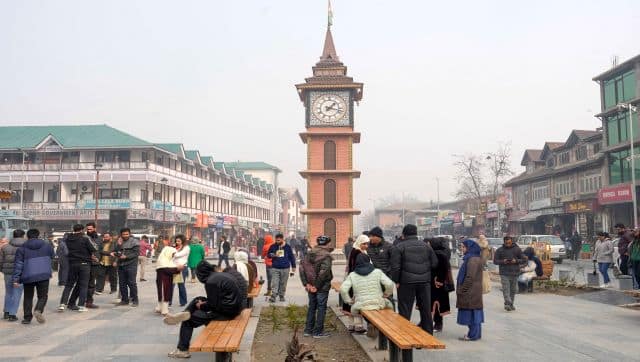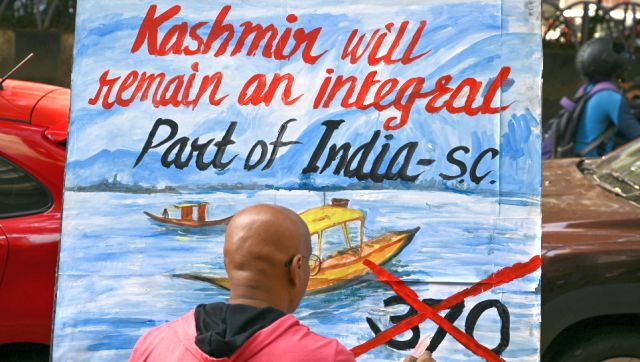Monday (11 December) will be remembered in history for being the day when the Supreme Court upheld the abrogation of Article 370 in Jammu and Kashmir by the Centre in 2019. The five-judge Constitution bench of the apex court in three opinions maintained that the erstwhile state of Jammu and Kashmir effectively holds no special status in the Indian Union. Chief Justice of India DY Chandrachud in his opinion, which he had penned for himself and Justices B R Gavai and Surya Kant, he maintained that Article 370 was a “temporary provision” and the President was empowered to revoke it in the absence of the Constituent Assembly of the erstwhile state. Meanwhile, Justices Sanjay Kishan Kaul and Sanjiv Khanna penned separate and concurring verdicts on the issue. Kaul, while reading out his verdict, recommended setting up of an “impartial truth and reconciliation commission” to probe and report on human rights violations by both state and non-state actors in Jammu and Kashmir since the 1980s, saying the “wounds need healing”. But what exactly is a truth and reconciliation commission and what purpose will it serve in the matter of Jammu and Kashmir? We get you the answers.
What’s a truth and reconciliation commission? A truth and reconciliation commission (TRC), also known as a truth commission or a truth and justice commission, is an official body tasked with discovering and revealing past wrongdoing by a government or even non-State actors in the hope of resolving conflict left over from the past. Experts observe that TRCs are a type of restorative justice, aimed at mending relationships between offenders, victims, and the group in which an offence occurs. TRCs are tasked with uncovering truths and distinguishing fact from lies. Acknowledgement, appropriate public grief, forgiveness, and healing are all possible through this process. Human rights activist Priscilla B Hayner in her book, titled Unspeakable Truths: Transitional Justice and the Challenge of Truth Commissions, defined a truth commission as one that: » Is focused on the past, rather than in ongoing events » Investigates a pattern of events that took place over a period of time » Engages directly and broadly with the affected population, gathering information on their experiences » Is a temporary body, with the aim of concluding with a final report » Is officially authorised or empowered by the state under review And are TRCs helpful? In essence, the mechanism is set up in good faith and is tasked with creating a timely report of the truth of human right violations, which, in turn, will help a society to move forward. But experts note that the biggest challenge for a truth commission is the matter of truth. How does one uncover the truth at a time when alternative facts and half-truths compete with the notion of the truth? [caption id=“attachment_13493842” align=“alignnone” width=“640”] Soldiers patrol past a cut-out of Prime Minister Narendra Modi in Srinagar as the Supreme Court upheld the abrogation of Article 370 in Jammu and Kashmir. AFP[/caption] Another challenge with truth commissions is who will actually institute such a mechanism. It has been seen historically that a TRC set up by the State is more effective than those set up by civil society, as they don’t have the same validity and endorsement. As Eric Brahm, an expert and human rights activist wrote in his paper Uncovering the Truth: Examining Truth Commission Success and Impact that truth commissions “represent some form of accountability for human rights abuses when historically this has been rare the world over”. This is considered a virtue when the only other option is that there is no accountability whatsoever, victims are ignored, their stories untold and there is little possibility of reconciliation, renewal, and peaceful coexistence. Experts note that the best truth commissions are those that focus on the victims, specifically the people or communities most marginalised by abuses or atrocities. As Vox reports, this often means giving victims or their descendants a chance to testify, sometimes publicly, about how abuse or oppression affected them or their communities.
**Also read: What has changed in Jammu and Kashmir since the abrogation of Article 370?** Have countries set up truth commissions in the past? Over the years, many countries have instituted truth and reconciliation commissions. The first well-known truth commission, known as the National Commission on the Disappeared, was established in Argentina in 1983. Since then, there have been many such TRCs were established across the world, with Britannica Encyclopaedia stating that there have been more than 35 truth commissions operated since the mid-1970s in all regions of the world. [caption id=“attachment_13493802” align=“alignnone” width=“640”]
Perhaps, the most popular and successful truth and reconciliation commission has been the one in South Africa in 1995.It was authorised by Nelson Mandela and chaired by Desmond Tutu after apartheid ended. File image/Reuters[/caption] The best known and most consequential of TRCs are the ones set up in South Africa, Australia and Canada. The truth commission in South Africa was set up in 1995 and was led by Archbishop Desmond Tutu. Its purpose was to investigate human rights violations committed by all sides during the era of apartheid. “It managed to get the story right of what had happened during apartheid and why it was that we had to endure those kinds of horrendous violations and infringement of the rights of so many people,” Howard Varney, a senior expert at the International Centre for Transitional Justice who consulted on South Africa’s TRC and continues to represent apartheid’s victims, told the Vox. Canada also set up a truth and reconciliation commission in 2008 to investigate the violations in the First Nation Indian residential school system (similar to the American-Indian boarding school systems, which involved the children of First Nation tribes being forcibly sent to residential schools, which were characterised by extreme discipline and often led to widespread abuse of the children as well as several deaths). [caption id=“attachment_13493852” align=“alignnone” width=“640”]
 People at Lal Chowk after the Supreme Court upheld the Centre’s decision to abrogate Article 370 of the Constitution, in Srinagar. PTI[/caption] Why Justice Kaul believes a TRC is the right way? In his verdict on Monday, Justice Sanjay Kishan Kaul, who hails from the former state, recommended a TRC. He said that men, women and children there have paid a heavy price due to the volatile situation, and during his travels he observed the consequences of inter-generational trauma on an already fractured society. “I cannot help but feel anguish for what people of the region have experienced and am constrained to write this Epilogue,” he said in his 121-page verdict.
Also read: Why Kashmiri Pandits seek justice before return and rehabilitation Hence, he believes that a truth commission would provide a balm to the people and also offer an opportunity to victims to narrate their stories, which facilitate an acknowledgement from those responsible for perpetuating the wrongs, and from society as a whole and this paves the way for reconciliation. Justice Kaul said that there have been calls previously to set up a truth and reconciliation commission in the Valley by different sections of society. “In view of the in-roads made globally, and endogenous requests for truth and reconciliation, I recommend the setting up of an impartial truth and reconciliation commission. The commission will investigate and report on the violation of human rights both by State and non-State actors perpetrated in Jammu & Kashmir at least since the 1980s and recommend measures for reconciliation,” he said. “In order to move forward, the wounds need healing, Justice Kaul said, adding, this commission should be set up expediently, ‘before memory escapes’, and the exercise should be time-bound. “There is already an entire generation of youth that has grown up with feelings of distrust and it is to them that we owe the greatest duty of reparation. At the same time, considering the significance of the matter and the sensitivities involved, it is my view that it is for the government to devise the manner in which this should be set up, and to determine the best way forward for the commission,” he said. He further added that the commission, once established, shouldn’t turn into a criminal court and must follow a humanised and personalised process enabling people to share what they have been through uninhibitedly. He said the TRC should learn from the South African model and on the principles of ‘ubuntu’, or the art of humanity, and inclusiveness should be central to the process.” This will facilitate a reparative approach that enables forgiveness for the wounds of the past, and forms the basis of achieving a shared national identity,” he said. Will the Centre adhere to this recommendation? Will there be a truth and reconciliation commission set up and will it help in healing the wounds long inflicted? Only time will tell. But for now, it does seem like a good first step in the process of healing. With inputs from agencies
People at Lal Chowk after the Supreme Court upheld the Centre’s decision to abrogate Article 370 of the Constitution, in Srinagar. PTI[/caption] Why Justice Kaul believes a TRC is the right way? In his verdict on Monday, Justice Sanjay Kishan Kaul, who hails from the former state, recommended a TRC. He said that men, women and children there have paid a heavy price due to the volatile situation, and during his travels he observed the consequences of inter-generational trauma on an already fractured society. “I cannot help but feel anguish for what people of the region have experienced and am constrained to write this Epilogue,” he said in his 121-page verdict.
Also read: Why Kashmiri Pandits seek justice before return and rehabilitation Hence, he believes that a truth commission would provide a balm to the people and also offer an opportunity to victims to narrate their stories, which facilitate an acknowledgement from those responsible for perpetuating the wrongs, and from society as a whole and this paves the way for reconciliation. Justice Kaul said that there have been calls previously to set up a truth and reconciliation commission in the Valley by different sections of society. “In view of the in-roads made globally, and endogenous requests for truth and reconciliation, I recommend the setting up of an impartial truth and reconciliation commission. The commission will investigate and report on the violation of human rights both by State and non-State actors perpetrated in Jammu & Kashmir at least since the 1980s and recommend measures for reconciliation,” he said. “In order to move forward, the wounds need healing, Justice Kaul said, adding, this commission should be set up expediently, ‘before memory escapes’, and the exercise should be time-bound. “There is already an entire generation of youth that has grown up with feelings of distrust and it is to them that we owe the greatest duty of reparation. At the same time, considering the significance of the matter and the sensitivities involved, it is my view that it is for the government to devise the manner in which this should be set up, and to determine the best way forward for the commission,” he said. He further added that the commission, once established, shouldn’t turn into a criminal court and must follow a humanised and personalised process enabling people to share what they have been through uninhibitedly. He said the TRC should learn from the South African model and on the principles of ‘ubuntu’, or the art of humanity, and inclusiveness should be central to the process.” This will facilitate a reparative approach that enables forgiveness for the wounds of the past, and forms the basis of achieving a shared national identity,” he said. Will the Centre adhere to this recommendation? Will there be a truth and reconciliation commission set up and will it help in healing the wounds long inflicted? Only time will tell. But for now, it does seem like a good first step in the process of healing. With inputs from agencies


)

)
)
)
)
)
)
)
)



